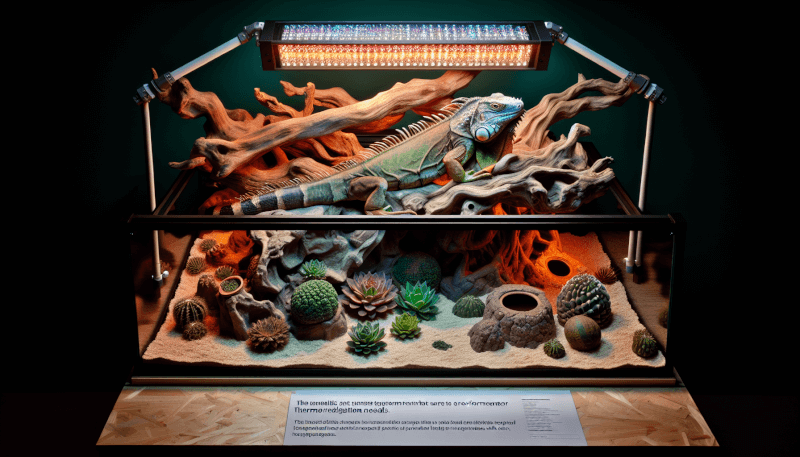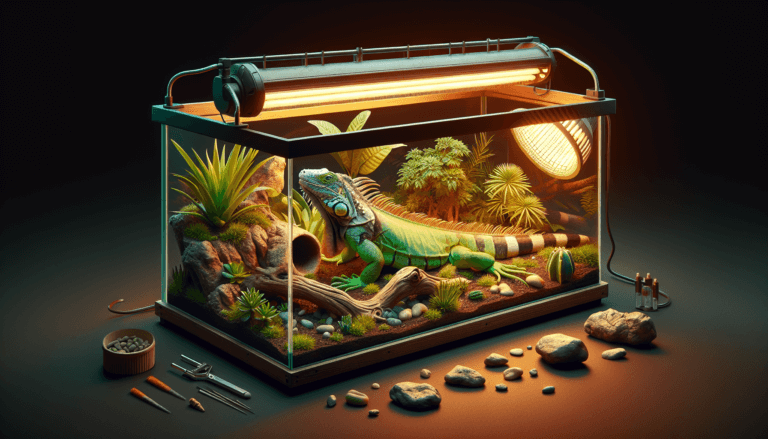Are you considering getting an iguana as a pet, but unsure about how to provide them with the right environment? Look no further! This article will outline the heat requirements for an iguana, ensuring that you can create a comfortable and suitable home for your scaly friend.
Ideal Temperature Range
Daytime Temperature
To provide optimal conditions for your iguana, it is crucial to maintain a suitable daytime temperature range in its enclosure. The ideal daytime temperature for an iguana should range between 85-95°F (29-35°C). This temperature range allows them to bask and metabolize effectively, promoting their overall well-being.
Ready for Cat Trivia?
Test your knowledge about cats!

Nighttime Temperature
While iguanas require warmth during the day, they also need a cooler environment at night to replicate their natural habitat. The nighttime temperature in their enclosure should range between 75-80°F (24-27°C). This drop in temperature helps them maintain their natural circadian rhythm and promotes healthy sleep patterns.
Temperature Gradient
Creating a Temperature Gradient
A temperature gradient is essential for iguanas as it allows them to regulate their body temperature effectively. To create a suitable temperature gradient in the enclosure, you can provide different heat sources at varying distances from the basking spot. This way, your iguana can choose its preferred temperature by moving closer or farther away from the heat source.
Importance of a Gradient
Having a temperature gradient in the enclosure is vital for your iguana’s thermoregulation. It allows them to move between warmer and cooler areas, mimicking their behavior in the wild. This allows them to regulate their body temperature according to their needs, helping them stay healthy and comfortable.
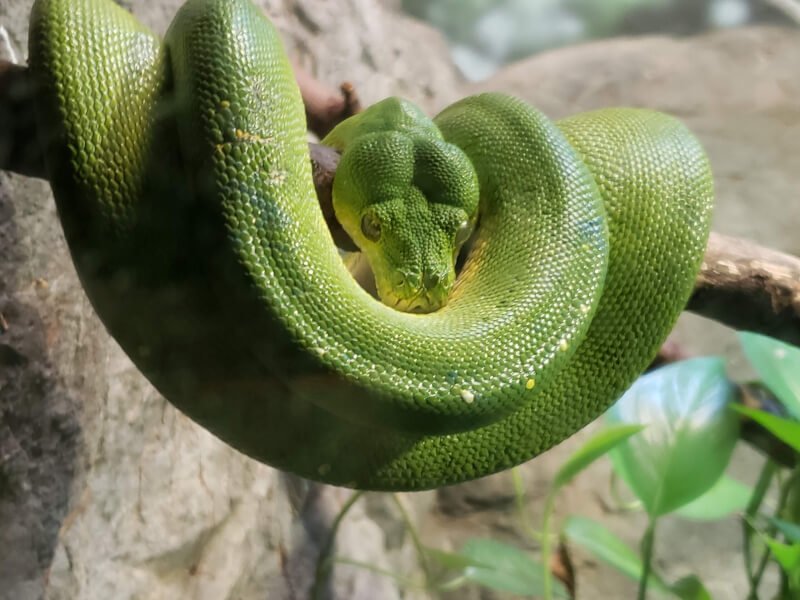
Basking Spot
Temperature Requirement
Iguanas are ectothermic creatures, meaning they rely on external heat sources to warm their bodies. A vital component of their enclosure is a basking spot that provides sufficient heat for their thermoregulation. The basking spot should be maintained at a temperature of around 95-105°F (35-40°C). This elevated temperature allows your iguana to properly digest food, absorb essential nutrients, and stimulate natural behaviors.
Providing a Basking Spot
To meet your iguana’s basking requirements, you can use a heat lamp or a ceramic heat emitter placed above a designated basking area. Ensure that the basking spot is large enough for your iguana to comfortably lie on and access the heat source. Additionally, it is crucial to position the basking spot closer to one end of the enclosure to create the desired temperature gradient.
Heat Sources
Types of Heat Sources
There are various types of heat sources available for iguana enclosures. Some common options include heat lamps, ceramic heat emitters, heat mats, and radiant heat panels. Each heat source has its advantages and considerations, so it is essential to choose the one that best suits your iguana’s needs and the size of your enclosure.
Choosing the Right Heat Source
When selecting a heat source for your iguana’s enclosure, consider factors such as the wattage needed, the heat output, and the safety features. Ensure that the chosen heat source provides consistent and reliable heat to maintain the desired temperatures within your iguana’s enclosure. Consulting with experienced reptile keepers or veterinarians can be helpful in making an informed decision.
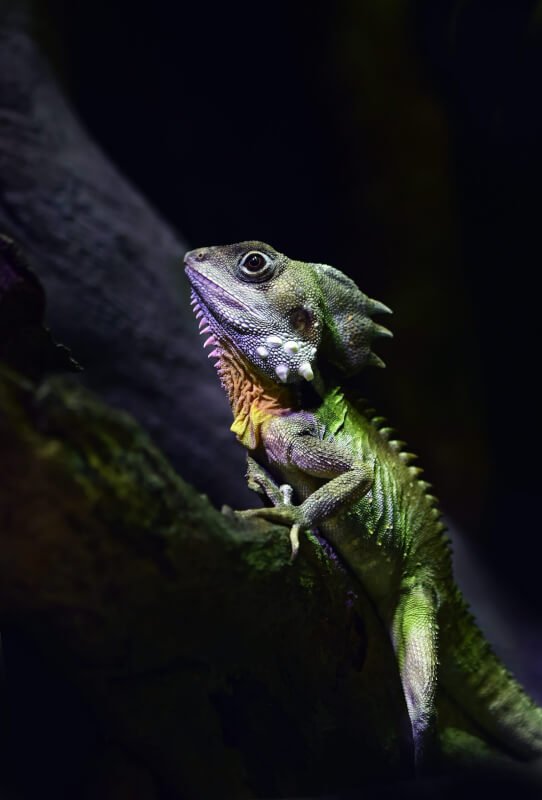
Thermoregulation
Understanding Thermoregulation
Thermoregulation is a vital process for iguanas as it allows them to control their body temperature. This process involves moving between different temperature zones to achieve optimal body heat. Iguanas thermoregulate by basking in warmer areas when they need to increase their body temperature or seeking cooler spots when they wish to cool down.
Importance of Thermoregulation for Iguanas
For iguanas, proper thermoregulation is crucial for various physiological processes, including digestion, metabolism, and overall health. By maintaining the correct temperature gradient in their enclosure, you are enabling your iguana to effectively regulate its body temperature, supporting its essential bodily functions and overall well-being.
Heat and UVB Lighting
Importance of Heat and UVB Lighting
Apart from providing heat, iguanas also require UVB lighting for their overall health and well-being. UVB lighting helps in the synthesis of vitamin D3, which plays a pivotal role in calcium absorption and bone health. It is crucial to provide both heat and UVB lighting to ensure your iguana’s vitality and prevent potential health issues.
Choosing the Right UVB Bulb
When selecting a UVB bulb for your iguana, opt for a reputable brand that provides the correct UVB output. It is essential to choose a bulb specifically designed for reptiles, as these bulbs emit UVB rays necessary for their well-being. Additionally, ensure the UVB bulb covers at least two-thirds of the enclosure to provide adequate exposure for your iguana.

Temperature Monitoring
Using Thermometers
To maintain proper temperature conditions for your iguana, it is crucial to monitor the temperatures regularly. Placing reliable thermometers at different locations within the enclosure allows you to track temperatures accurately. Digital thermometers with remote probes are often recommended as they provide precise readings and allow you to easily monitor temperature gradients.
Maintaining Consistent Temperatures
Regularly monitoring the temperatures in your iguana’s enclosure ensures that you can quickly identify any fluctuations that may occur. It is essential to make adjustments, such as changing heat sources or repositioning them, to maintain the desired temperature range consistently. Consistency in temperature ensures the well-being and comfort of your iguana.
Heating in Enclosures
Enclosure Size
The size of the enclosure plays a crucial role in providing suitable heating for your iguana. Larger enclosures require more heat sources to maintain the desired temperature gradient effectively. It is important to consider the size of your iguana’s enclosure when selecting and positioning heat sources to ensure adequate heating throughout the entire space.
Positioning Heat Sources
Strategic placement of heat sources within the enclosure is essential to create a temperature gradient and mimic the natural habitat of iguanas. Position the basking spot heat source closer to one end of the enclosure while placing cooler areas at the opposite end. This positioning allows your iguana to choose the appropriate temperature zone based on its needs.
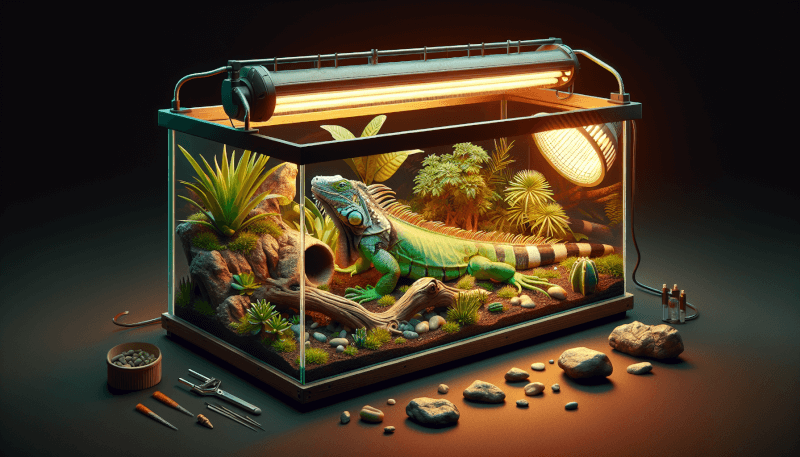
Common Heating Mistakes
Overheating
One common mistake to avoid is overheating the enclosure. Excessive heat can lead to heat exhaustion or even heat stroke, which can be dangerous for your iguana’s health. Regularly monitor the temperatures and make sure they stay within the recommended range. Adjust the heat sources as needed to maintain a safe and comfortable environment for your pet.
Underheating
On the other hand, underheating the enclosure can also pose risks to your iguana’s health. Inadequate heat can lead to poor digestion, weakened immune system, and other health issues. Regularly monitor the temperatures and ensure that the basking spot maintains the appropriate temperature range. Adjust the heat sources or seek professional advice if you notice any signs of underheating.
Incorrect Placement of Heat Sources
Incorrectly positioning heat sources can disrupt the desired temperature gradient in the enclosure. Place the basking spot heat source closer to the designated basking area and ensure it provides the necessary warmth. Avoid placing heat sources too close to the cool areas to prevent overheating or creating an unbalanced environment. Regularly check the temperature distribution within the enclosure to ensure it remains optimal.
Heating in Outdoor Enclosures
Factors to Consider
Heating in outdoor enclosures requires additional considerations due to the surrounding environment. Factors such as seasonal variations, weather conditions, and local climate need to be taken into account. It is crucial to have a reliable heating system that can withstand outdoor conditions and maintain the desired temperature range, ensuring your iguana’s comfort and well-being.
Providing Shelter
In outdoor enclosures, providing suitable shelter is essential to protect your iguana from extreme temperatures and weather conditions. This shelter can include areas with shade, insulated structures, and additional heat sources if needed. By providing adequate shelter, you ensure that your iguana can still thermoregulate effectively and find comfort in various weather conditions.
In conclusion, understanding and fulfilling the heat requirements for your iguana are crucial for their overall health and well-being. Creating a suitable temperature gradient, maintaining consistent temperatures, and providing appropriate heat sources and UVB lighting are all vital aspects of proper care. Regular monitoring and avoiding common heating mistakes will ensure that your iguana thrives in its enclosure, mimicking its natural habitat and promoting a happy and healthy life.
